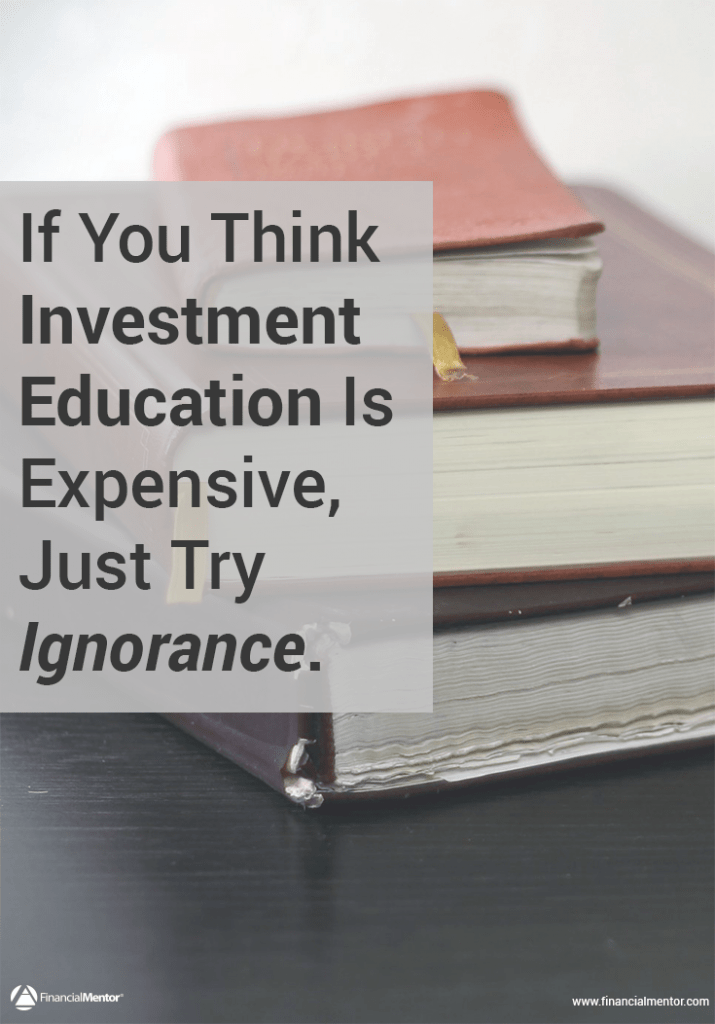The best investment you can make is in yourself and your financial education. It’s the obvious starting point to building wealth. Do you know the difference between a balance sheet and an income statement? Do you know the necessary due diligence steps to take before putting capital at risk on a new investment?
Amazingly, the single biggest skill that can make or break your financial success isn’t taught in school. You can graduate with a four year degree and learn nothing about personal finance or investing. Doctors and attorneys can open their own practices without any clue how to read a financial statement. Business owners and investors can remain dangerously ignorant of the tax law.The truth is, financial literacy is the essential skill you must develop if your goal is to build wealth and enjoy financial security. There’s no alternative.
Seven Reasons:
- Provides dividends for life that nobody can ever take from you.
- Increases your earning potential.
- Increases your return on investment.
- Improves the quality of your life and finances.
- Secures your retirement.
- Defends your portfolio from unnecessary losses.
- Provides peace of mind around money.
That’s a long list of advantages, but what about the disadvantages? Why doesn’t everyone master these essential skills for investing and develop their financial literacy? Because it requires time and effort — and they’re too busy. That’s it. There are no other disadvantages.
If you’re willing to commit the time, you can have all the advantages that accrue to becoming financially literate. All you have to do is put out the effort, and a lifetime of benefits is yours for the taking. Invest in yourself, in your education. There’s nothing better.” – Sylvia Porter
It’s one of those “duh-obvious” decisions that’s easy to understand, but hard to live. After all, what do you prefer: a little bit of effort now in exchange for a lifetime of financial security, or a little bit of procrastination and avoidance now in exchange for a lifetime of financial mediocrity?
Not a very difficult decision, but surprisingly few people make the wise choice.Financial education is one of the great bargains in life: it costs little, risks nothing, and returns huge rewards. It’s the best investment you can make.The sooner you get it, the more it’ll be worth to you. The longer you wait, the more it’ll cost you.
1. Most Investment Advice is a Dangerous Half-Truth
Aren’t you tired of all the financial and investment experts with their conflicting investment advice?
One expert says diversify to reduce risk, and another expert calls it di-worsefying that ensures mediocre results.
One expert says pay down all your debt because it’s bad, and another says leverage up with good debt to build wealth.
One expert says the stock market is the key to riches, and another expert tells you more millionaires come from real estate than any other source.How is a person supposed to learn how to invest money when the supposed experts can’t even agree? It’s enough to make you go bonkers! Who can you trust?
Each authority speaks as if there is one and only one right answer, yet each financial expert offers differing and often conflicting investment advice. It’s frustrating. It drives me nuts when supposed financial experts speak in over-simplified, dogmatic statements as if they have the one right answer.
True experts know that most financial truths are more subtle and complex, so they don’t insult your intelligence with over-simplified, sound-bite investment advice.Even the most basic investment ideas such as buy and hold stocks for the long term are too complex to be adequately explained in a brief article.
The reality is each item of conflicting investment advice above is partially true and partially false – depending on the situation.There are times when it makes sense to leverage up with good debt, and there are other situations where it can be equally correct to pay off existing debt.There are times when “buy and hold stocks for the long term” is a sound strategy, and there are other times when the risk isn’t justified by the reward.
Each is a dangerous half-truth.One reason financial education is necessary is to understand the subtle shades of gray hiding behind all the investment half-truths you hear. How else are you going to process this information into profitable investment decisions? You must know when a conditional-truth is applicable and when it should be disregarded, because it can get you in financial trouble.
For example, do you understand when buy and hold is a smart investment strategy, and when the risk is not justified by the reward? Do you know when to leverage yourself with debt to grow wealth, and when it makes sense to pay off debt?What is the best wealth building vehicle – paper assets, business, or real estate – and why? Questions like these can make or break your financial future.
![]() Learning the assumptions and reasons behind investment half-truths is one reason why financial education is necessary. It’s the only way you can know who is right, who is wrong, and what to do in a world of conflicted and contradictory investment advice.
Learning the assumptions and reasons behind investment half-truths is one reason why financial education is necessary. It’s the only way you can know who is right, who is wrong, and what to do in a world of conflicted and contradictory investment advice.

2. One Size Doesn’t fit all Investors
Despite what all the investment experts selling seminars and courses want you to believe, there aren’t any secrets to investing. To paraphrase John Bogle of Vanguard Investment fame, “The secret is there are no secrets.”
There are many different ways to invest profitably, and there are many sources where you can learn the information. There’s nothing new under the sun, and no marketer has a corner on teaching any particular type of investment strategy.
If you don’t want to pay a high-priced guru thousands for his boot camp or seminar, then you can probably find very similar information for less than a hundred dollars at your local library or online bookstore. What you can’t get from a bookstore — or most gurus — is the real key to financial security: figuring out which of the many available investment strategies will work for your personal situation. Their investment advice is generic, but you need it personalized. Not all investment strategies are appropriate for all people, but there’s one right solution for you. Your job is to find it so that you can achieve financial security.
You’re a unique individual with your own skills, background, experiences, and outlook on life. You have a risk tolerance unique to you and preferences, time frames, and goals that are different from everyone else’s. What are the odds that a weekend investment seminar or week-long boot camp teaching one specific investment technique is going to be the right fit for your unique needs? The hidden assumption behind most investor education is “one size fits all.” It doesn’t work with clothes, relationships, or sunglasses, and it certainly doesn’t work with investment strategy. One size does not fit all.
“If you want to be truly successful invest in yourself to get the knowledge you need to find your unique factor. When you find it and focus on it and persevere your success will blossom.” – Sidney Madwed
